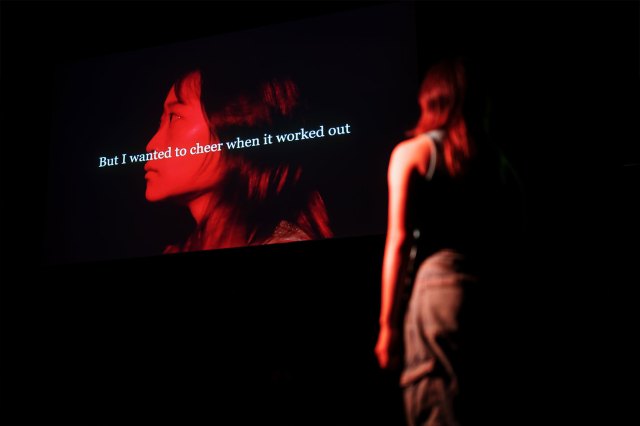Instructions at Summerhall – Edinburgh Fringe Review
Nathan Ellis’ experimental piece has picked up a Fringe First award

Instructions states its purpose on a screen at the start. It is a play. It is performed in a theatre. Every day it is performed by a different, unrehearsed performer. Today’s performer is Amaia. The audience applauds Amaia.
I applauded loudly. I’d seen Amaia Naima Aguinaga two days early in the rather brilliant The Chaos That Has Been and Will No Doubt Return and loved both her personality and her lively versatility. Now here she is again, looking slightly nervous, on an empty stage, following the instructions on a monitor in front of her.
Some of the instructions, and contributions from various voices, are flashed up on the large screen facing the audience. To one side is a camera, where we can see Amaia reacting as she finds herself in the centre of a story that is as much a surprise to her as it is to us. How she reacts, how we react, will make the narrative slightly different every day.
Writer Nathan Ellis has form in this field. He’s interested in shifting boundaries: between art and life, film and stage, screen and live performance, humanity and technology. His first full-length play (No One is Going to Come to Save You) attempted to find form to express its subject matter about anxiety; his second (work.txt) was performed by the audience.
Instructions is similarly experimental, showing its workings in front of us, while at the same time asking troubling questions about what is real and what is feigned. This obviously applies to Amaia as she reveals her acting skills, responding to commands to show different emotions – seductive, confused, angry. The monitor asks her to “fake cry” and to “cry”, a distinction that seems to shoot to the heart of an actor’s art. It requires her to perform the same line of dialogue in multiple ways.
The cleverness of the piece is that it keeps both its story and its ideas moving. There is a plot, though it would be a pity to give too much of it away. And there is a point: in a world where AI is increasingly a threat to creators, this is a questioning, needling piece about what exactly it is that makes us human.
It’s smart, succinct and riveting. It has won a Fringe First which probably guarantees it a life beyond the Fringe. Certainly, it deserves it. By the most economical means, it is one of the most thought-provoking pieces I have seen. Plus, it was a joy to see Amaia again. She is a star. Audience applauds.



















